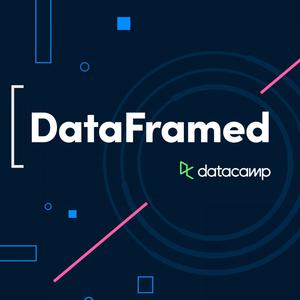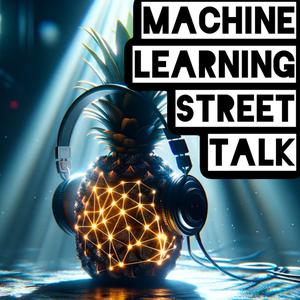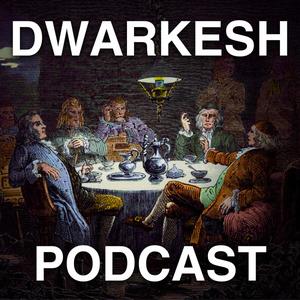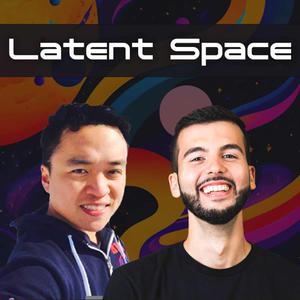
Vanishing Gradients
Hugo Bowne-Anderson
a data podcast with hugo bowne-anderson
- 1 hour 20 minutesEpisode 42: Learning, Teaching, and Building in the Age of AI
In this episode of Vanishing Gradients, the tables turn as Hugo sits down with Alex Andorra, host of Learning Bayesian Statistics. Hugo shares his journey from mathematics to AI, reflecting on how Bayesian inference shapes his approach to data science, teaching, and building AI-powered applications.
They dive into the realities of deploying LLM applications, overcoming “proof-of-concept purgatory,” and why first principles and iteration are critical for success in AI. Whether you’re an educator, software engineer, or data scientist, this episode offers valuable insights into the intersection of AI, product development, and real-world deployment.
LINKS
4 January 2025, 3:00 am - 43 minutes 51 secondsEpisode 41: Beyond Prompt Engineering: Can AI Learn to Set Its Own Goals?
Hugo Bowne-Anderson hosts a panel discussion from the MLOps World and Generative AI Summit in Austin, exploring the long-term growth of AI by distinguishing real problem-solving from trend-based solutions. If you're navigating the evolving landscape of generative AI, productionizing models, or questioning the hype, this episode dives into the tough questions shaping the field.
The panel features:
- Ben Taylor (Jepson) – CEO and Founder at VEOX Inc., with experience in AI exploration, genetic programming, and deep learning.
- Joe Reis – Co-founder of Ternary Data and author of Fundamentals of Data Engineering.
- Juan Sequeda – Principal Scientist and Head of AI Lab at Data.World, known for his expertise in knowledge graphs and the semantic web.
The discussion unpacks essential topics such as:
- The shift from prompt engineering to goal engineering—letting AI iterate toward well-defined objectives.
- Whether generative AI is having an electricity moment or more of a blockchain trajectory.
- The combinatorial power of AI to explore new solutions, drawing parallels to AlphaZero redefining strategy games.
- The POC-to-production gap and why AI projects stall.
- Failure modes, hallucinations, and governance risks—and how to mitigate them.
- The disconnect between executive optimism and employee workload.
Hugo also mentions his upcoming workshop on escaping Proof-of-Concept Purgatory, which has evolved into a Maven course "Building LLM Applications for Data Scientists and Software Engineers" launching in January. Vanishing Gradient listeners can get 25% off the course (use the code VG25), with $1,000 in Modal compute credits included.
A huge thanks to Dave Scharbach and the Toronto Machine Learning Society for organizing the conference and to the audience for their thoughtful questions.
As we head into the new year, this conversation offers a reality check amidst the growing AI agent hype.
LINKS
30 December 2024, 11:00 pm - Ben Taylor (Jepson) – CEO and Founder at VEOX Inc., with experience in AI exploration, genetic programming, and deep learning.
- 1 hour 43 minutesEpisode 40: What Every LLM Developer Needs to Know About GPUs
Hugo speaks with Charles Frye, Developer Advocate at Modal and someone who really knows GPUs inside and out. If you’re a data scientist, machine learning engineer, AI researcher, or just someone trying to make sense of hardware for LLMs and AI workflows, this episode is for you.
Charles and Hugo dive into the practical side of GPUs—from running inference on large models, to fine-tuning and even training from scratch. They unpack the real pain points developers face, like figuring out:
- How much VRAM you actually need.
- Why memory—not compute—ends up being the bottleneck.
- How to make quick, back-of-the-envelope calculations to size up hardware for your tasks.
- And where things like fine-tuning, quantization, and retrieval-augmented generation (RAG) fit into the mix.
One thing Hugo really appreciate is that Charles and the Modal team recently put together the GPU Glossary—a resource that breaks down GPU internals in a way that’s actually useful for developers. We reference it a few times throughout the episode, so check it out in the show notes below.
🔧 Charles also does a demo during the episode—some of it is visual, but we talk through the key points so you’ll still get value from the audio. If you’d like to see the demo in action, check out the livestream linked below.
This is the "Building LLM Applications for Data Scientists and Software Engineers" course that Hugo is teaching with Stefan Krawczyk (ex-StitchFix) in January. Charles is giving a guest lecture at on hardware for LLMs, and Modal is giving all students $1K worth of compute credits (use the code VG25 for $200 off).
LINKS
- The livestream on YouTube
- The GPU Glossary by the Modal team
- What We’ve Learned From A Year of Building with LLMs by Charles and friends
- Charles on twitter
- Hugo on twitter
- Vanishing Gradients on twitter
24 December 2024, 4:00 am - How much VRAM you actually need.
- 1 hour 43 minutesEpisode 39: From Models to Products: Bridging Research and Practice in Generative AI at Google Labs
Hugo speaks with Ravin Kumar,*Senior Research Data Scientist at Google Labs. Ravin’s career has taken him from building rockets at SpaceX to driving data science and technology at Sweetgreen, and now to advancing generative AI research and applications at Google Labs and DeepMind. His multidisciplinary experience gives him a rare perspective on building AI systems that combine technical rigor with practical utility.
In this episode, we dive into:
• Ravin’s fascinating career path, including the skills and mindsets needed to work effectively with AI and machine learning models at different stages of the pipeline.
• How to build generative AI systems that are scalable, reliable, and aligned with user needs.
• Real-world applications of generative AI, such as using open weight models such as Gemma to help a bakery streamline operations—an example of delivering tangible business value through AI.
• The critical role of UX in AI adoption, and how Ravin approaches designing tools like Notebook LM with the user journey in mind.We also include a live demo where Ravin uses Notebook LM to analyze my website, extract insights, and even generate a podcast-style conversation about me. While some of the demo is visual, much can be appreciated through audio, and we’ve added a link to the video in the show notes for those who want to see it in action. We’ve also included the generated segment at the end of the episode for you to enjoy.
LINKS
- The livestream on YouTube
- Google Labs
- Ravin's GenAI Handbook
- Breadboard: A library for prototyping generative AI applications
As mentioned in the episode, Hugo is teaching a four-week course, Building LLM Applications for Data Scientists and SWEs, co-led with Stefan Krawczyk (Dagworks, ex-StitchFix). The course focuses on building scalable, production-grade generative AI systems, with hands-on sessions, $1,000+ in cloud credits, live Q&As, and guest lectures from industry experts.
Listeners of Vanishing Gradients can get 25% off the course using this special link or by applying the code VG25 at checkout.
25 November 2024, 4:00 pm - 1 hour 23 minutesEpisode 38: The Art of Freelance AI Consulting and Products: Data, Dollars, and Deliverables
Hugo speaks with Jason Liu, an independent AI consultant with experience at Meta and Stitch Fix. At Stitch Fix, Jason developed impactful AI systems, like a $50 million product similarity search and the widely adopted Flight recommendation framework. Now, he helps startups and enterprises design and deploy production-level AI applications, with a focus on retrieval-augmented generation (RAG) and scalable solutions.
This episode is a bit of an experiment. Instead of our usual technical deep dives, we’re focusing on the world of AI consulting and freelancing. We explore Jason’s consulting playbook, covering how he structures contracts to maximize value, strategies for moving from hourly billing to securing larger deals, and the mindset shift needed to align incentives with clients. We’ll also discuss the challenges of moving from deterministic software to probabilistic AI systems and even do a live role-playing session where Jason coaches me on client engagement and pricing pitfalls.
LINKS
- The livestream on YouTube
- Jason's Upcoming course: AI Consultant Accelerator: From Expert to High-Demand Business
- Hugo's upcoming course: Building LLM Applications for Data Scientists and Software Engineers
- Jason's website
- Jason's indie consulting newsletter
- Your AI Product Needs Evals by Hamel Husain
- What We’ve Learned From A Year of Building with LLMs
- Dear Future AI Consultant by Jason
- Alex Hormozi's books
- The Burnout Society by Byung-Chul Han
- Jason on Twitter
- Vanishing Gradients on Twitter
- Hugo on Twitter
- Vanishing Gradients' lu.ma calendar
- Vanishing Gradients on YouTube
4 November 2024, 11:00 pm - 50 minutes 36 secondsEpisode 37: Prompt Engineering, Security in Generative AI, and the Future of AI Research Part 2
Hugo speaks with three leading figures from the world of AI research: Sander Schulhoff, a recent University of Maryland graduate and lead contributor to the Learn Prompting initiative; Philip Resnik, professor at the University of Maryland, known for his pioneering work in computational linguistics; and Dennis Peskoff, a researcher from Princeton specializing in prompt engineering and its applications in the social sciences.
This is Part 2 of a special two-part episode, prompted—no pun intended—by these guys being part of a team, led by Sander, that wrote a 76-page survey analyzing prompting techniques, agents, and generative AI. The survey included contributors from OpenAI, Microsoft, the University of Maryland, Princeton, and more.
In this episode, we cover:
The Prompt Report: A comprehensive survey on prompting techniques, agents, and generative AI, including advanced evaluation methods for assessing these techniques.
Security Risks and Prompt Hacking: A detailed exploration of the security concerns surrounding prompt engineering, including Sander’s thoughts on its potential applications in cybersecurity and military contexts.
AI’s Impact Across Fields: A discussion on how generative AI is reshaping various domains, including the social sciences and security.
Multimodal AI: Updates on how large language models (LLMs) are expanding to interact with images, code, and music.
Case Study - Detecting Suicide Risk: A careful examination of how prompting techniques are being used in important areas like detecting suicide risk, showcasing the critical potential of AI in addressing sensitive, real-world challenges.
The episode concludes with a reflection on the evolving landscape of LLMs and multimodal AI, and what might be on the horizon.
If you haven’t yet, make sure to check out Part 1, where we discuss the history of NLP, prompt engineering techniques, and Sander’s development of the Learn Prompting initiative.
LINKS
8 October 2024, 6:00 am - 1 hour 3 minutesEpisode 36: Prompt Engineering, Security in Generative AI, and the Future of AI Research Part 1
Hugo speaks with three leading figures from the world of AI research: Sander Schulhoff, a recent University of Maryland graduate and lead contributor to the Learn Prompting initiative; Philip Resnik, professor at the University of Maryland, known for his pioneering work in computational linguistics; and Dennis Peskoff, a researcher from Princeton specializing in prompt engineering and its applications in the social sciences.
This is Part 1 of a special two-part episode, prompted—no pun intended—by these guys being part of a team, led by Sander, that wrote a 76-page survey analyzing prompting techniques, agents, and generative AI. The survey included contributors from OpenAI, Microsoft, the University of Maryland, Princeton, and more.
In this first part,
- we’ll explore the critical role of prompt engineering,
- & diving into adversarial techniques like prompt hacking and
- the challenges of evaluating these techniques.
- we’ll examine the impact of few-shot learning and
- the groundbreaking taxonomy of prompting techniques from the Prompt Report.
Along the way,
- we’ll uncover the rich history of natural language processing (NLP) and AI, showing how modern prompting techniques evolved from early rule-based systems and statistical methods.
- we’ll also hear how Sander’s experimentation with GPT-3 for diplomatic tasks led him to develop Learn Prompting, and
- how Dennis highlights the accessibility of AI through prompting, which allows non-technical users to interact with AI without needing to code.
Finally, we’ll explore the future of multimodal AI, where LLMs interact with images, code, and even music creation. Make sure to tune in to Part 2, where we dive deeper into security risks, prompt hacking, and more.
LINKS
30 September 2024, 8:00 am - 58 minutes 13 secondsEpisode 35: Open Science at NASA -- Measuring Impact and the Future of AI
Hugo speaks with Dr. Chelle Gentemann, Open Science Program Scientist for NASA’s Office of the Chief Science Data Officer, about NASA’s ambitious efforts to integrate AI across the research lifecycle. In this episode, we’ll dive deeper into how AI is transforming NASA’s approach to science, making data more accessible and advancing open science practices. We explore
- Measuring the Impact of Open Science: How NASA is developing new metrics to evaluate the effectiveness of open science, moving beyond traditional publication-based assessments.
- The Process of Scientific Discovery: Insights into the collaborative nature of research and how breakthroughs are achieved at NASA.
- ** AI Applications in NASA’s Science:** From rats in space to exploring the origins of the universe, we cover how AI is being applied across NASA’s divisions to improve data accessibility and analysis.
- Addressing Challenges in Open Science: The complexities of implementing open science within government agencies and research environments.
- Reforming Incentive Systems: How NASA is reconsidering traditional metrics like publications and citations, and starting to recognize contributions such as software development and data sharing.
- The Future of Open Science: How open science is shaping the future of research, fostering interdisciplinary collaboration, and increasing accessibility.
This conversation offers valuable insights for researchers, data scientists, and those interested in the practical applications of AI and open science. Join us as we discuss how NASA is working to make science more collaborative, reproducible, and impactful.
LINKS
- The livestream on YouTube
- NASA's Open Science 101 course <-- do it to learn and also to get NASA Swag!
- Science Cast
- NASA and IBM Openly Release Geospatial AI Foundation Model for NASA Earth Observation Data
- Jake VanderPlas' daily conundrum tweet from 2013
- Replit, "an AI-powered software development & deployment platform for building, sharing, and shipping software fast."
19 September 2024, 7:00 am - 1 hour 42 minutesEpisode 34: The AI Revolution Will Not Be Monopolized
Hugo speaks with Ines Montani and Matthew Honnibal, the creators of spaCy and founders of Explosion AI. Collectively, they've had a huge impact on the fields of industrial natural language processing (NLP), ML, and AI through their widely-used open-source library spaCy and their innovative annotation tool Prodigy. These tools have become essential for many data scientists and NLP practitioners in industry and academia alike.
In this wide-ranging discussion, we dive into:
• The evolution of applied NLP and its role in industry
• The balance between large language models and smaller, specialized models
• Human-in-the-loop distillation for creating faster, more data-private AI systems
• The challenges and opportunities in NLP, including modularity, transparency, and privacy
• The future of AI and software development
• The potential impact of AI regulation on innovation and competitionWe also touch on their recent transition back to a smaller, more independent-minded company structure and the lessons learned from their journey in the AI startup world.
Ines and Matt offer invaluable insights for data scientists, machine learning practitioners, and anyone interested in the practical applications of AI. They share their thoughts on how to approach NLP projects, the importance of data quality, and the role of open-source in advancing the field.
Whether you're a seasoned NLP practitioner or just getting started with AI, this episode offers a wealth of knowledge from two of the field's most respected figures. Join us for a discussion that explores the current landscape of AI development, with insights that bridge the gap between cutting-edge research and real-world applications.
LINKS
- The livestream on YouTube
- How S&P Global is making markets more transparent with NLP, spaCy and Prodigy
- A practical guide to human-in-the-loop distillation
- Laws of Tech: Commoditize Your Complement
- spaCy: Industrial-Strength Natural Language Processing
- LLMs with spaCy
- Explosion, building developer tools for AI, Machine Learning and Natural Language Processing
- Back to our roots: Company update and future plans, by Matt and Ines
- Matt's detailed blog post: back to our roots
- Ines on twitter
- Matt on twitter
- Vanishing Gradients on Twitter
- Hugo on Twitter
Check out and subcribe to our lu.ma calendar for upcoming livestreams!
22 August 2024, 7:00 am - 1 hour 25 minutesEpisode 33: What We Learned Teaching LLMs to 1,000s of Data Scientists
Hugo speaks with Dan Becker and Hamel Husain, two veterans in the world of data science, machine learning, and AI education. Collectively, they’ve worked at Google, DataRobot, Airbnb, Github (where Hamel built out the precursor to copilot and more) and they both currently work as independent LLM and Generative AI consultants.
Dan and Hamel recently taught a course on fine-tuning large language models that evolved into a full-fledged conference, attracting over 2,000 participants. This experience gave them unique insights into the current state and future of AI education and application.
In this episode, we dive into:
- The evolution of their course from fine-tuning to a comprehensive AI conference
- The unexpected challenges and insights gained from teaching LLMs to data scientists
- The current state of AI tooling and accessibility compared to a decade ago
- The role of playful experimentation in driving innovation in the field
- Thoughts on the economic impact and ROI of generative AI in various industries
- The importance of proper evaluation in machine learning projects
- Future predictions for AI education and application in the next five years
- We also touch on the challenges of using AI tools effectively, the potential for AI in physical world applications, and the need for a more nuanced understanding of AI capabilities in the workplace.
During our conversation, Dan mentions an exciting project he's been working on, which we couldn't showcase live due to technical difficulties. However, I've included a link to a video demonstration in the show notes that you won't want to miss. In this demo, Dan showcases his innovative AI-powered 3D modeling tool that allows users to create 3D printable objects simply by describing them in natural language.
LINKS
- The livestream on YouTube
- Educational resources from Dan and Hamel's LLM course
- Upwork Study Finds Employee Workloads Rising Despite Increased C-Suite Investment in Artificial Intelligence
- Episode 29: Lessons from a Year of Building with LLMs (Part 1)
- Episode 30: Lessons from a Year of Building with LLMs (Part 2)
- Dan's demo: Creating Physical Products with Generative AI
- Build Great AI, Dan's boutique consulting firm helping clients be successful with large language models
- Parlance Labs, Hamel's Practical consulting that improves your AI
- Hamel on Twitter
- Dan on Twitter
- Vanishing Gradients on Twitter
- Hugo on Twitter
12 August 2024, 8:00 am - 1 hour 15 minutesEpisode 32: Building Reliable and Robust ML/AI Pipelines
Hugo speaks with Shreya Shankar, a researcher at UC Berkeley focusing on data management systems with a human-centered approach. Shreya's work is at the cutting edge of human-computer interaction (HCI) and AI, particularly in the realm of large language models (LLMs). Her impressive background includes being the first ML engineer at Viaduct, doing research engineering at Google Brain, and software engineering at Facebook.
In this episode, we dive deep into the world of LLMs and the critical challenges of building reliable AI pipelines. We'll explore:
- The fascinating journey from classic machine learning to the current LLM revolution
- Why Shreya believes most ML problems are actually data management issues
- The concept of "data flywheels" for LLM applications and how to implement them
- The intriguing world of evaluating AI systems - who validates the validators?
- Shreya's work on SPADE and EvalGen, innovative tools for synthesizing data quality assertions and aligning LLM evaluations with human preferences
- The importance of human-in-the-loop processes in AI development
- The future of low-code and no-code tools in the AI landscape
We'll also touch on the potential pitfalls of over-relying on LLMs, the concept of "Habsburg AI," and how to avoid disappearing up our own proverbial arseholes in the world of recursive AI processes.
Whether you're a seasoned AI practitioner, a curious data scientist, or someone interested in the human side of AI development, this conversation offers valuable insights into building more robust, reliable, and human-centered AI systems.
LINKS
- The livestream on YouTube
- Shreya's website
- Shreya on Twitter
- Data Flywheels for LLM Applications
- SPADE: Synthesizing Data Quality Assertions for Large Language Model Pipelines
- What We’ve Learned From A Year of Building with LLMs
- Who Validates the Validators? Aligning LLM-Assisted Evaluation of LLM Outputs with Human Preferences
- Operationalizing Machine Learning: An Interview Study
- Vanishing Gradients on Twitter
- Hugo on Twitter
In the podcast, Hugo also mentioned that this was the 5th time he and Shreya chatted publicly. which is wild!
If you want to dive deep into Shreya's work and related topics through their chats, you can check them all out here:
- Outerbounds' Fireside Chat: Operationalizing ML -- Patterns and Pain Points from MLOps Practitioners
- The Past, Present, and Future of Generative AI
- LLMs, OpenAI Dev Day, and the Existential Crisis for Machine Learning Engineering
- Lessons from a Year of Building with LLMs
Check out and subcribe to our lu.ma calendar for upcoming livestreams!
27 July 2024, 3:00 am - More Episodes? Get the App
The TWIML AI Podcast (formerly This Week in Machine Learning & Artificial Intelligence)
 DataFramed
DataFramed
 Machine Learning Street Talk (MLST)
Machine Learning Street Talk (MLST)
 Dwarkesh Podcast
Dwarkesh Podcast
"The Cognitive Revolution" | AI Builders, Researchers, and Live Player Analysis
 Latent Space: The AI Engineer Podcast — Practitioners talking LLMs, CodeGen, Agents, Multimodality, AI UX, GPU Infra and all things Software 3.0
Latent Space: The AI Engineer Podcast — Practitioners talking LLMs, CodeGen, Agents, Multimodality, AI UX, GPU Infra and all things Software 3.0
Your feedback is valuable to us. Should you encounter any bugs, glitches, lack of functionality or other problems, please email us on [email protected] or join Moon.FM Telegram Group where you can talk directly to the dev team who are happy to answer any queries.